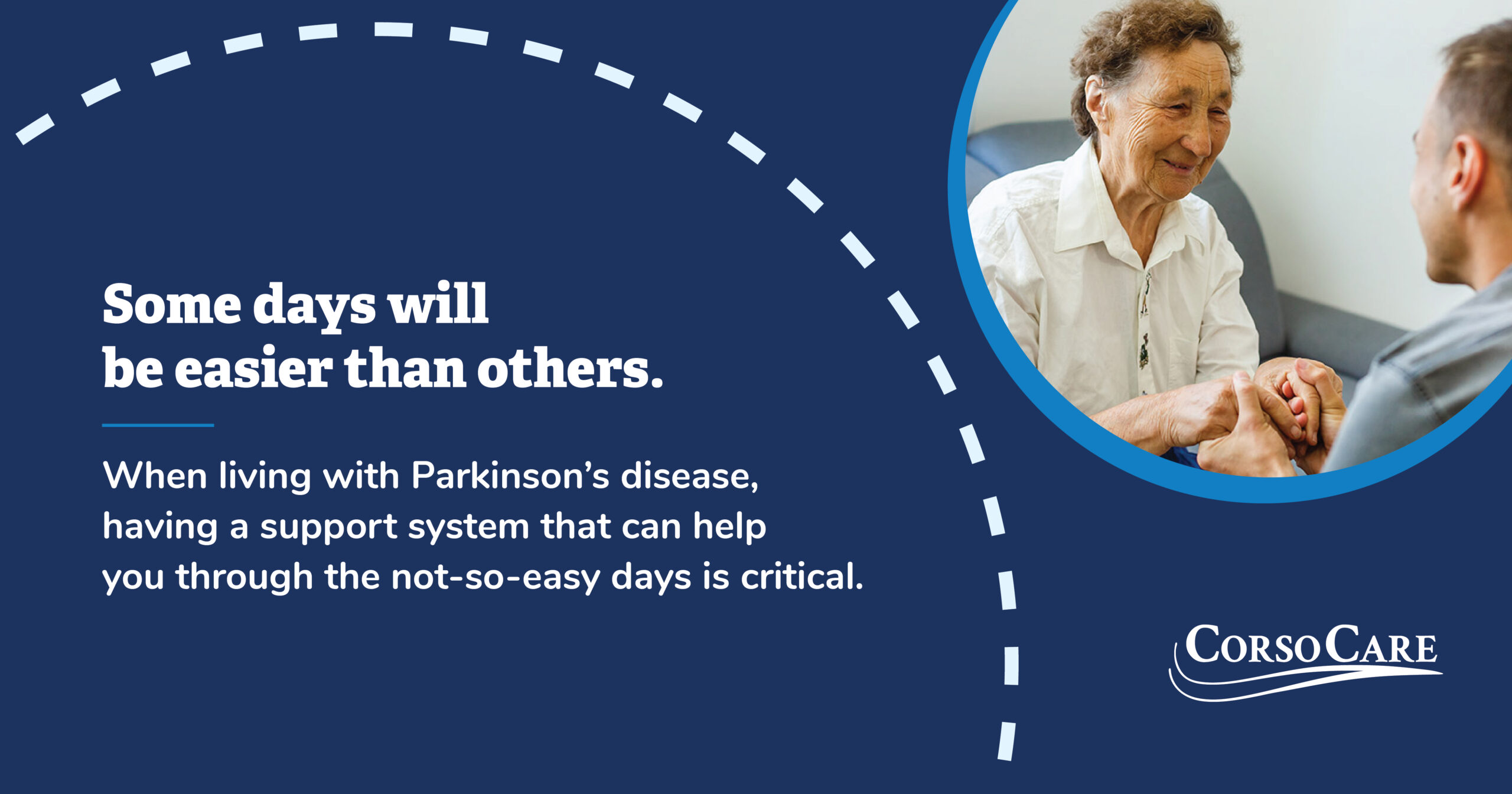7 Tips For Living With Parkinson’s Disease
Parkinson’s disease affects everyone differently.
No matter what life with Parkinson’s disease looks like for you, here are some tips you can implement into your daily routine to help improve your symptoms, manage your disease and live your life to the fullest.
1. Exercise Regularly
Exercise is beneficial for everyone, but for someone with Parkinson’s, exercise can help improve symptoms, too. Studies have shown that exercise may even slow the progression of the disease. For someone with Parkinson’s, exercise can give you:
- More flexibility.
- Better balance.
- Less anxiety and depression.
- Improved coordination.
- Added muscle strength.
Some commonly recommended exercises include walking, swimming or water aerobics, stretching, yoga or seated yoga, and more. For a closer look at what exercises may work best for you, talk to your doctor, physical therapist and/or occupational therapist.
2. Eat A Healthy Diet
Parkinson’s disease can cause bone thinning, dehydration, weight loss and constipation. Eating a healthy, nutritious diet can help combat these symptoms and keep you feeling good.
A healthy diet for someone with Parkinson’s will include whole grains, vegetables, fruits and have limited sugar, saturated fat and alcohol. And of course, you should be sure to drink a lot of water, so you stay hydrated.
3. Get Enough Sleep
There’s nothing like a good night sleep that will have you feeling rested and ready for your day. People with Parkinson’s may experience symptoms that affect their sleep like abnormal dreams, restlessness and trouble getting comfortable.
To make sure you’re getting the recommended eight hours of sleep, stick to a routine at night, go to bed and walk up at the same time every day.
Are you having trouble falling asleep? Try these suggestions:
- Keep your room dark at night.
- Make sure the room is cool.
- If you nap during the day, keep it to 40 minutes or less.
- Avoid caffeine, alcohol and exercise for at least four hours before you plan to sleep.
4. Make Your Space Safe And Comfortable
Mobility issues, balance instability and physical ailments are common symptoms of Parkinson’s. As you move around or exercise, these symptoms can increase your risk of falling. It’s always better to be safe, so make sure you have a plan in place of what to do if you fall.
You can limit your risk of falling by moving slowly, planting your feet firmly when you step, looking ahead instead of down, and considering a mobility aid like a can or walker.
You can also make changes to your home that will help reduce your risk of falls. To help make your space safer, be sure to secure furniture to the floor or wall. Keep you walking space clear and utilize non-slip rugs, slippers or socks.
5. Manage Your Stress
On top of managing a new diagnosis and all the feelings that come with it, the disease itself can cause people with Parkinson’s to struggle with their mental health.One of the common effects of Parkinson’s disease is increased anxiety or depression.
If you notice signs of depression, agitation, anxiety or other mental health concerns, talk to your doctor.
Another way to manage stress caused by a Parkinson’s diagnosis is to stay informed on the disease. Knowledge is power. For many, understanding the causes, symptoms and treatments of Parkinson’s can make you feel more prepared to live with Parkinson’s.
6. Ask For Help When You Need It
You’re not in this alone. When living with Parkinson’s Disease, some days will be easier than others. Remember to lean on your friends and family around you who offer to help and build a support group.

When living with Parkinson’s disease, some days will be easier than others. Having a support team that can help through this life altering disease is crucial to help maintain independence.
Sometimes it’s most comforting to be with someone who understands. Ask your doctor to recommend in-persona and online support groups for people with Parkinson’s disease that you can join. These groups can provide additional advice, comfort and friendship. They’ll also help you to feel less alone.
7. Be An Active Participant In Your Care
Surround yourself with a care team that specializes in Parkinson’s and understands your goals. Some will go the distance, staying with you throughout your life with Parkinson’s. Others will be sprinters, accompanying you as you manage specific symptoms, emotions or changes.
Some professionals in your care team may include:
- Neurologist who specializes in movement disorders
- Nurse
- Physical therapist
- Occupational therapist
- Speech therapist
- Social worker
- Pharmacist
- Neuropsychologist
- Neurosurgeon
Listening to your care team is one way that you can stay informed, but it can be hard to know what questions to ask.
Here’s a list of common questions about Parkinson’s to get you started:
- How quickly does Parkinson’s disease usually progress and where am in that progression?
- Are there ways I can slow the progression of my Parkinson’s disease?
- What tests or tools should I use to measure my progression?
- Besides taking medications, what else do you recommend to help manage my Parkinson’s disease?
- What symptoms or side effects should I report immediately?
- How often should I make appointments for checkups?
- Are there other specialists or health care professionals that you recommend to help manage my care?
- How and when should I take my medication? Before, with, or between meals?
- What are the potential side effects of my medication? Is there anything I can do to avoid or manage the side effects that I might experience?
CorsoCare Is Here For You
For more information on Parkinson’s disease and how CorsoCare can support you and your loved one, call us at 248-438-8535.
